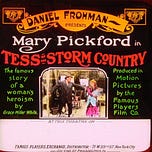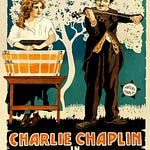Fresh from watching Mary Pickford as Tessibel Skinner, heroine of Tess of the Storm Country, I’m left with mixed feelings. The film isn’t bad, although the story is more than a little heavy-handed and melodramatic, and Edwin S. Porter, as was his nature, simply refuses to move his camera. His tableau-like shots, and almost fundamental misunderstanding of the power of editing, reduce potentially dramatic shots to mundane ones, and limit the overall power of the film. Yet still, somehow, he manages to turn out an enjoyable 5 reels of film. (That translates into 80 minutes, as each reel held between 15 and 20 minutes worth of film.)
Mary Pickford, whom I saw in smaller roles in short films like The Country Doctor, A Beast at Bay, and My Baby, is the star here, and she is hands down the best thing about this movie. You can see her charm and personality shine through even the grainy and blurred version of the film I was forced to watch on YouTube, and when she is spiritedly booting people, literally, out the door of her hut, I couldn’t help but smile. I envy audiences who saw a pristine print of this when it came out, which, by the way, was on March 30th, 1914.
The story is basically rich vs. poor. Tess lives in a shanty town with her father, situated on a beach just below the estate of the wealthy Elias Graves, played by William Walters in one of his final roles. He’s obsessed with rousting the squatters from the beach, and after being thwarted in his eviction attempt decides to force them out by getting a law passed banning net fishing, which is how the squatters get their food. Some of the squatters disobey the new law, which leads to a murder. Ben Letts, a scoundrel who is trying to woo Tess, shoots an official who catches him fishing. Unfortunately, the police figure Tess’ father for the murder, and he’s sentenced to death.
Suddenly the story takes a big turn, as dad in jail is put on a back burner to a burgeoning romance between Elias Graves’ son Frederick, and our beloved guttersnipe Tess. He’s visiting from school, along with his fraternity brother Dan, who falls for Frederick’s sister Teola. Eventually they head back to school, but not before Teola becomes pregnant. She is writing to tell Dan the news when she gets a letter informing her that Dan died heroically in a fire at the frat house. Grief-stricken, she head to the beach and casts herself into the sea, only to be saved by Tess, who agrees to pretend the baby is hers when it comes. They come up with a clever plan— they write a note for Teola’s parents saying Teola sprained her ankle and will be at Tess’ hut for four days. Four days later, there’s a baby, and Teola heads home no worse for the wear. It feels like they glossed over some things there, but hey, it was 1914. Hollywood had standards.
The movie then goes into melodrama overdrive. Frederick comes home and is aghast to find Tess with a baby. Despite loving her, he shuns her for her evil ways. Plus, Tess can’t afford to keep the baby in good health. She is caught stealing some milk, and even after being whipped for her crime, isn’t allowed to bring the milk to her baby. Meanwhile, on the beach, Ben Letts is revealed as the true killer when he attempts to kill someone else.
Things come to a head when the baby gets sick and is near death. Tess goes to a church to have it baptized before it dies, but Elias Graves intercedes, telling the priest he will not allow such a desecration in his church. This is the last straw for poor Teola, who reveals to everyone that it’s her baby. Tess slinks home, leaving the sick baby with his true family.
At home, her father awaits, freed from jail and happy to see his daughter. As they embrace, Frederick shows up, chagrined and hoping for a second chance. He presents Tess with a letter form his father, informing her that both Teola and the baby are dead— we never find out why Teola died— and that he can only apologize for how he treated her and her father. Frederick and Tess reunite, and presumably live happily ever after.
Next I’m watching: Cabiria [1914], directed by Giovanni Pastrone.














Share this post